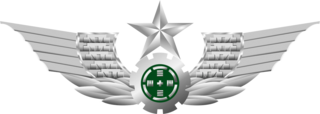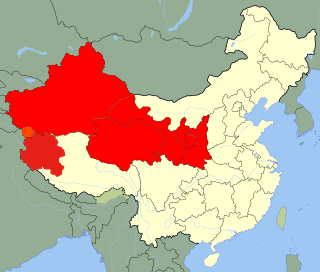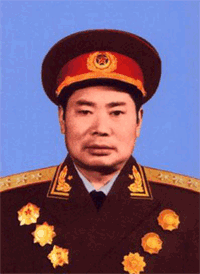
The People's Liberation Army Ground Force (PLAGF),also referred to as the PLA Army,is the land-based service branch of the People's Liberation Army (PLA),and also its largest and oldest branch. The PLAGF can trace its lineage from 1927 as the Chinese Red Army;however,it was not officially established until 1948.

Xie Fuzhi was a Chinese Communist Party military commander,political commissar,and national security specialist. He was born in 1909 in Hong'an County,Hubei and died in Beijing in 1972. Xie was known for his efficiency and his loyalty to Mao Zedong,and during the Cultural Revolution he played a key role in hunting down Mao's enemies in his capacity as Minister of Public Security from 1959 to 1972.
Group armies or army groups or combined corps,are corps-level military formations of the People's Liberation Army Ground Force of China. Despite what the name suggests,current Group Armies are not army-level formations,but corps-sized formations commanding 12 to 14 brigades,roughly equivalent to United States Army Corps.

The Jinan Military Region was a PLA Military Region located in the east of the People's Republic of China,covering the Shandong and Henan Provinces,which also formed military districts. It appears that Yang Dezhi was one of the first commander of the Jinan MR,from 1958. It was considered a strategic reserve. It included some of the area previously within the Wuhan Military Region,which was disbanded in 1985–88.

The Shenyang Military Region was one of seven military regions for the Chinese People's Liberation Army. It has command and control of military and armed police forces in the three northeast provinces of Jilin,Heilongjiang,and Liaoning,which also form Military Districts. This region is now superseded by the Northern Theater Command.

The Lanzhou Military Region was one of seven military regions in the People's Republic of China. It directed all People's Liberation Army and People's Armed Police forces in Xinjiang,Qinghai,Gansu,Ningxia,Shaanxi,and Ngari Prefecture in northwest Tibet. It was headquartered in Lanzhou in Gansu Province. It is bordered to the south by the Chengdu Military Region,and to the north by Mongolia,the Altai Republic,which is a political subdivision of the Russian Federation,and Kazakhstan. This region is now part of the Western Theater Command due to the military reforms of 2015.

A theater command is a multi-service formation of China's People's Liberation Army subordinated to the Central Military Commission. Theater commands are broadly responsible for strategy,plans,tactics,and policy specific to their assigned area of responsibility. In wartime,they will likely have full control of subordinate units;in peacetime,units also report to their service headquarters. The services retain administrative and "constructive" control. There are 5 theater commands:Eastern,Southern,Western,Northern,and Central theater commands,organized by a geographical basis.

Yang Dezhi was a Chinese general and politician. He was senior military officer in the North China Field Army,a veteran of the Korean War and commander in China during the Sino–Vietnamese War.
Longhai Campaign (陇海战役),also known as the Campaign along the Longhai Railway (陇海路战役),was a campaign launched against the nationalists by the communists during Chinese Civil War in the post World War II era. The campaign was a coordinated offensive in support of the other two campaigns the Communists launched against the nationalists,namely,the Campaign of the North China Plain Pocket and the Central Jiangsu Campaign. Longhai Campaign resulted in the communist victory,achieving the Communists objective of relieving the pressure on their comrades in the other two campaigns this one supported,enabling those in the Campaign of the North China Plain Pocket to successfully escape from the nationalists and those in the Central Jiangsu Campaign to also score a huge victory over the nationalists.
The Zhengtai Campaign (正太战役) was a series of battles fought between the nationalists and the communists during the Chinese Civil War in the post World War II era,and resulted in the communist victory.
Lüliang campaign (吕梁战役),also called Southwestern Shanxi campaign (晋西南战役),was a series of battles fought between the nationalists and the communists in Lüliang region in southwestern Shanxi during the Chinese Civil War in the post World War II era,and resulted in the communist victory.
Campaign along the Southern Section of the Datong-Puzhou Railway (同蒲路南段战役) was a campaign fought between the nationalists and the communists during the Chinese Civil War in the post-World War II era and resulted in the communist victory.

During the 1989 Tiananmen Square protests and massacre in Beijing,the Chinese People's Liberation Army (PLA) played a decisive role in enforcing martial law,using force to suppress the demonstrations in the city. The killings of protestors in Beijing continue to taint the legacies of the party elders,led by Chinese leader Deng Xiaoping,and weigh on the generation of leaders whose careers advanced as their more moderate colleagues were purged or sidelined at the time. Within China,the role of the military in 1989 remains a subject of private discussion within the ranks of the party leadership and PLA.

Liu Zihou was a Communist revolutionary leader and politician of the People's Republic of China. He served as Governor of Hubei and Hebei provinces,and as the top leader of Hebei during the Cultural Revolution,but was ousted from his positions after he opposed the reforms of Deng Xiaoping. He was a protégéof Li Xiannian,one of China's top leaders.
The 28th Group Army was an army corps of the Chinese People's Liberation Army that existed from 1949 to 1998. From 1952 to 1971,the 28th Army was based in Putian,Fujian and belonged to the Fujian Military Region. From 1971 to 1998,this army corps belonged to the Beijing Military Region and was based in Shanxi Province,initially in Houma and then in Datong. At the time of its dissolution in 1998,the 28th Army was composed of the 82nd,83rd and 205th Infantry Divisions,the 7th Armored Division,an artillery brigade,an anti-aircraft brigade,an engineer regiment,a communication regiment and a reconnaissance battalion. The army corps’unit ID number was 51366.

Song Puxuan is a retired general of the Chinese People's Liberation Army (PLA). He served as director of the Logistic Support Department of the Central Military Commission from 2017 to 2019. Prior to that,he served as commander of the Northern Theater Command,commander of the Beijing Military Region,deputy commander of the Nanjing Military Region,president of the PLA National Defence University.

Li Zhimin(Chinese:李志民or 李凤瑞or 李明阶;pinyin:LǐZhìmín or LǐFèngruìor LǐMíngjiē;July 9,1906 –November 16,1987) was a general of the People's Liberation Army from Liuyang,Hunan. Li was the former political commissar and director for the Political Department of the Chinese People's Volunteers.

The Central Theater Command is one of the five theater commands of the People's Liberation Army of China,and was founded on 1 February 2016. Its predecessors were the Beijing Military Region and Jinan Military Region.

The National Day Parade,officially the National Day of the People's Republic of China Parade,is a civil-military parade event held at Tiananmen Square in Beijing,the capital of the People's Republic of China,on the National Day of the People's Republic of China on 1 October. It is organized by the People's Liberation Army,the People's Armed Police and the Militia,as well as civilian groups of the Chinese Communist Party (CCP). It has been held every decade since 1959,annually from 1950 to 1959,and has been broadcast live on China Central Television since 1984.

People's Liberation Army Beijing Garrison District is a military district of corps grade (正军级) under the direct jurisdiction of the PLA Army HQ and the Central Military Commission. The Garrison is responsible for the defense of the city of Beijing,the protection of all the state institutions in the capital,military mobilization in case of war,and civilian-military relations.















